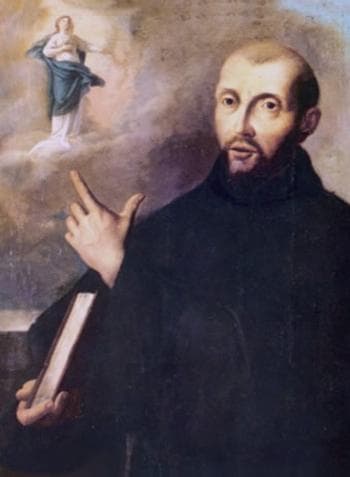Saint Francesco Antonio Fasani
Saint
Feast Day: November 29
Birth: August 6, 1681
Death: November 29, 1742
Biography
Saint Francesco Antonio Fasani, also known as Antony Fasani, Francis Anthony Fasani, or simply Francis Fasani, was born on 6 August 1681 in Lucera, Foggia, Puglia, Italy. From an early age, he displayed exceptional piety and spiritual sensitivity. His deep love for God and his desire to serve others led him to join the Conventual Franciscan order in 1695, taking the name Francis. After his ordination in 1705, Saint Francesco Antonio Fasani dedicated his life to the service of God and his fellow friars. He first taught philosophy to younger members of the order, passing on his knowledge and wisdom to those who would follow in his footsteps. He was then appointed as the guardian of his friary, responsible for its administration and spiritual well-being. Saint Francesco Antonio Fasani's exceptional leadership qualities and commitment to his calling eventually led him to become the provincial of the Order. In this role, he diligently guided and cared for the Friars Minor Conventual within his jurisdiction. His selflessness and humility set an example for all who came into contact with him. After his tenure as provincial, Saint Francesco Antonio Fasani served as the master of novices, responsible for the training and formation of new members of the order. His dedication to mentoring and guiding the next generation of friars demonstrated his unwavering commitment to the Franciscan tradition. Saint Francesco Antonio Fasani's journey continued back to his hometown, where he became the pastor. In this role, he not only shepherded the spiritual needs of his parishioners but also embodied the Franciscan virtues of poverty and compassion. Saint Fasani was known for his close relationship with the poor and marginalized, never hesitating to seek help from benefactors to alleviate their suffering. His loyalty to the less fortunate earned him a reputation as a friend of the poor. In addition to his pastoral duties, Saint Francesco Antonio Fasani was sought after as a confessor and preacher. His sermons were powerful and inspiring, revealing his deep spiritual connection to God and his profound understanding of the Catholic faith. His ability to touch the hearts and souls of those who listened to him led many to embrace a life of faith and conversion. Saint Francesco Antonio Fasani was also known for his profound prayer life, marked by moments of mystical experience. It was said that he would levitate while engaging in deep prayer, a phenomenon that attested to his extraordinary union with God. His mystical encounters with the Divine served as an inspiration to others and a testament to his holy life. On 29 November 1742, Saint Francesco Antonio Fasani passed away in Lucera, Italy, from natural causes. News of his death quickly spread, and children ran through the streets, crying, "The saint is dead! The saint is dead!" Such was the impact of his life and the reverence with which he was held by the community. Saint Francesco Antonio Fasani was buried at the church of San Francesco di Lucera, where his tomb became a place of veneration and prayer. His reputation for holiness and the numerous miracles attributed to his intercession led to the formal recognition of his heroic virtues on 1 June 1891 by Pope Leo XIII. Further recognition came when Pope Pius XII beatified Saint Francesco Antonio Fasani on 15 April 1951, acknowledging his sanctity and the example he provided to the faithful. Finally, on 13 April 1986, Pope John Paul II canonized him as a saint, affirming his enduring impact on the Catholic Church and declaring him a model of Christian virtue. Saint Francesco Antonio Fasani is revered as the patron saint of Lucera, Italy, where his legacy continues to inspire and guide the faithful. His life serves as an example of selfless devotion to God, compassionate care for the marginalized, and a profound love for prayer and mystical union with the Divine.
